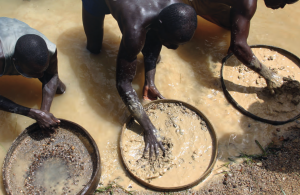WHO: Urgent action needed to combat poisoning from artisanal gold mining in Africa
Libreville, 6 November 2018 - Ministers, officials and health experts from across Africa, the World Health Organization (WHO) and the United Nations met to push forward action to halt the damaging effects of artisanal and small scale gold mining on human health and the environment today (6 November).
Virtually every country in Africa has some form of artisanal and small scale mining with more than 54 million Africans estimated to be dependent on the activity for their livelihoods.
“Small scale gold mining is a crucial source of income for millions of Africans, but it is often dangerous, damaging, and in the worst cases, deadly, for artisanal miners,” said Dr Magaran Bagayoko, Director (a.i), Communicable Diseases Cluster, WHO’s Regional Office for Africa.
The artisanal and small-scale gold miners often use mercury, a highly toxic chemical to separate their gold from ore, putting their health at great risk. Alternatives to mercury do exist, but for many miners, operating independently without government support, income trumps the health and environmental risks.
Many of the people involved in this hidden and often informal activity are the most vulnerable in society with women representing more than 50% of the miners.
“Exposure to elemental mercury can cause life-long disability, kidney failure and speech, sight and cognitive impairment,” said Dr Bagayoko. “Women, pregnant women and children are at particular risk.”
To combat mercury poisoning, 24 countries in the African Region have now adopted the Minamata Convention on Mercury, a global treaty named after a Japanese town where a chemical company caused mass mercury poisoning several decades ago.
The convention tasks governments and businesses to protect citizens and communities from the harmful effects of mercury exposure, including applying controls to polluting industries.
For mining, the convention compels governments to promote mercury-free gold processing methods, take special measures to protect vulnerable populations from exposure and put an end to particularly harmful practices in processing gold from ore.
For its part, WHO is aiding African governments in tackling mercury poisoning and other health risks related to artisanal mining by strengthening their national health systems, developing training manuals for health workers, helping set up national observatories on chemicals and recently launching a regional network of poison control centres.
At a WHO-hosted side event at the Third Interministerial Conference on Health and the Environment in Africa held in Gabon on 6 November, Ministers and officials from across the continent met to set ways for integrating interventions to address mercury and other artisanal gold mining health issues into existing public health strategies.
In Ghana, Mozambique and Nigeria, WHO, with funding from the Global Environment Facility (GEF), is undertaking institutional and health situation assessments in vulnerable communities as part of these countries’ efforts to develop national action plans on artisanal small-scale gold mining.



